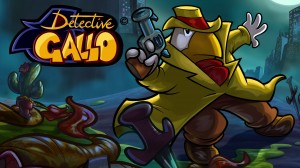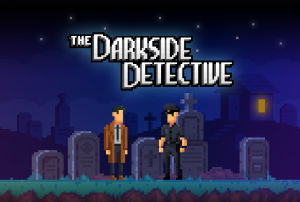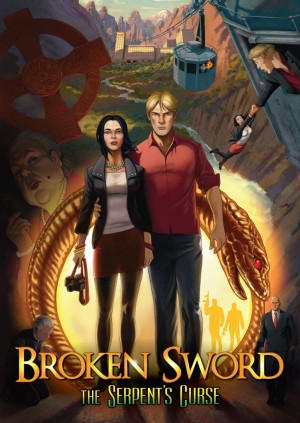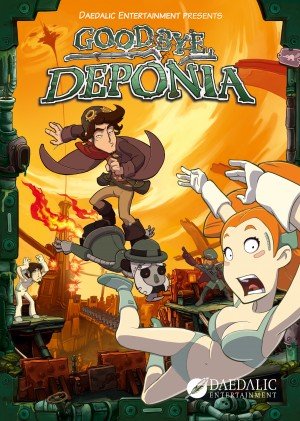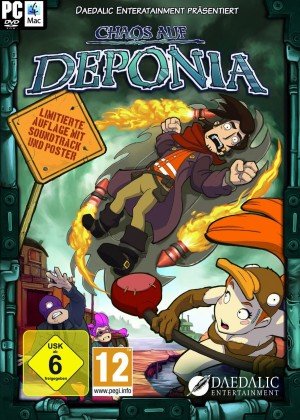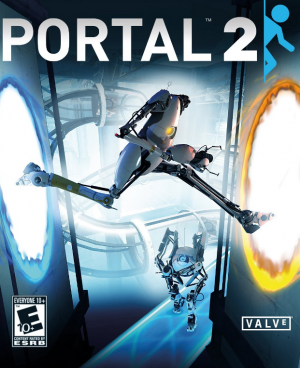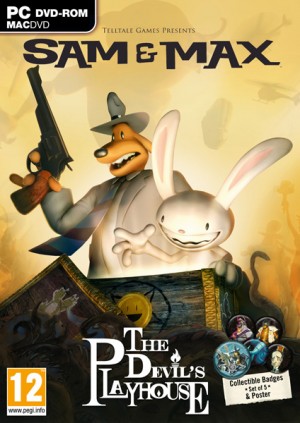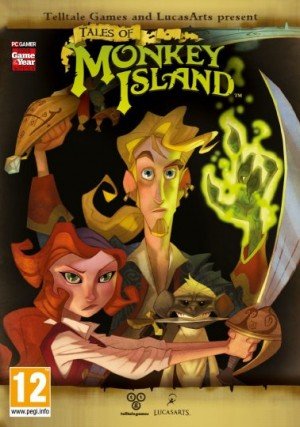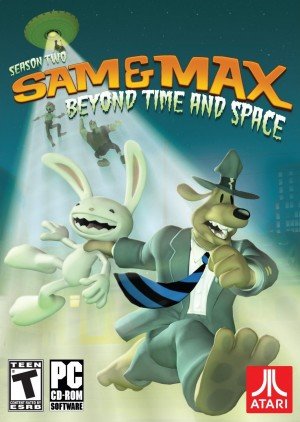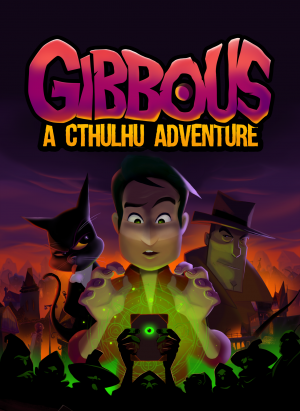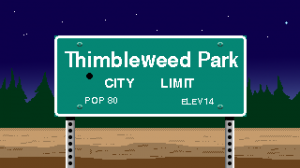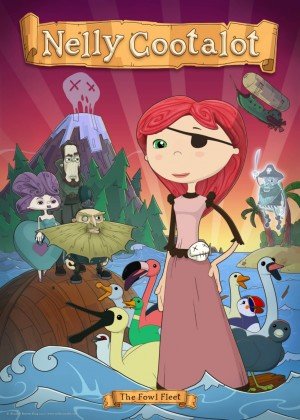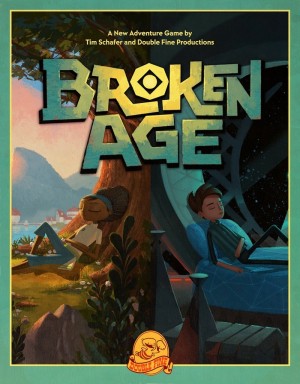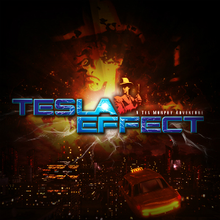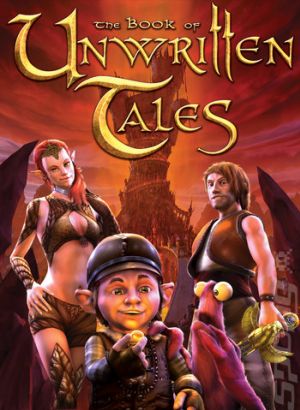Best Writing – ComedyAggie Award Winners

Arguably the hardest genre to write well, comedy done right has the ability both to amuse and uplift, finding humour in the ordinary and laughter in the unexpected. Often dismissed for not being “serious writing” (oh, the irony!), comedy has long been a beloved adventure staple and deserves appropriate recognition.
» Aggie Awards - category overview
The Aggie award winners:
Hypnospace Outlaw (2019 winner)
You’d be forgiven for going into Hypnospace Outlaw thinking it would be nothing more than a tongue-in-cheek, irony-drenched parody of a long-lost era of internet history. And indeed that alone would have been great, but scratch under the surface and you find something much greater: a deeply earnest, loving tribute to a time when the internet was more innocent and more honest, but still weird as all hell. Playing as an Enforcer charged with maintaining order within a fictional OS on the burgeoning World Wide Web, we laugh at Zane’s nu metal-laden homepage and the ego-driven drama of the Freelands because we know those people. We may even have been those people, not so very long ago. It’s funny… because it’s true? But it’s also funny because it’s just plain funny, whether you’re stumbling across Chowder Man’s epic ballad to shaving or accidentally sparking a crusade to protect users’ god-given rights to post fan images of Gumshoe Gooper. Hypnospace Outlaw is hilarious, and even more impressively, it’s authentically human. And now it’s an Aggie Award winner for best comedy writing.
2019 winner of:
2019 Readers Choice' winner of:
- No awards won
Detective Gallo (2018 winner)
The premise of Footprint Games’ Detective Gallo is so ridiculous, you know you’re in for a thoroughly offbeat adventure before you even start. The main character is a hard-boiled private eye rooster, tasked with investigating “fowl play” of epic proportions: the murder of a millionaire’s prized plants. (Maybe not so epic, then, but who’s going to trust Gallo with a really important case?) While he sleuths with the utmost seriousness, Gallo’s sardonic wit is the source of much humour. He promises to act with “the speed of the law: slow and unrelenting” and thrives on dishing out wisecracks to anyone he meets. When his doting admirer begs him to sample her sickly sweet wares, Gallo acknowledges that his job requires him to swallow some bitter things, but even that’s a step too far. He even has a seemingly never-ending list of rules for the job, which swing between earnest and outlandish illogicality with ease.
It’s not just the feathered lead who provides the laughs, however. Everyone you meet has a bit of an edge, which makes for amusing back-and-forth banter with the titular star. There’s a time and a place for comedy – in this case, it’s all the time and everywhere. You’re never far from a silly joke, pun or downright absurdity. There’s an undercover cactus convinced that the ladies love him, an intergalactic cult that is only allowed to think if their leader allows it, and a gun-wielding criminal who rediscovers himself as a meditative soul. Not all the gags land, but more than enough of them do to keep a grin on your face throughout. So with that in mind, we’ve arrived at our own Rule #2018: When awarding our Aggie for Best Comedy Writing, give it to the chicken with an attitude and six-shooter that’s permanently cocked and loaded.
2018 winner of:
2018 Readers Choice' winner of:
- No awards won
The Darkside Detective (2017 winner)
You can’t tell from a screenshot, a synopsis or even a trailer why Spooky Doorway’s The Darkside Detective works as well as it does. On the surface its elements seem modest enough: a retro point-and-click anthology adventure with blocky pixels and text-only subtitles. Even thematically it comes across as fairly familiar, with an under-appreciated detective and his goofy sidekick, self-referential humour, and occult elements mixed with a whimsical tone. It’s only when actually playing the game that the experience can truly be appreciated. In peppering players with always amusing, often hilarious dialogue, the end result is delightfully charming and witty, and thereby deserving of our 2017 Aggie Award for best comedic writing.
Experiencing this game’s six distinct tales is a wonderful refresher on why comedy adventure games can be so much fun. Every hotspot in the environment, every line of conversation promises a fresh pun, quip or gag, and rarely do they fall flat or feel mean-spirited. Partners in paranormal crime-fighting, the two protagonists play off each other to great effect: Officer Dooley is one of the most endearingly offbeat sidekicks in years for us, but often leaves Detective Francis McQueen thoroughly exasperated, creating a wonderfully light-hearted dynamic between them. We dare anyone NOT to laugh when Dooley follows McQueen into a small closet and shuts the door behind them. There’s plenty of other ridiculous characters to meet along the way, too, who both help and hinder your investigations, providing plenty of laughs along the way. Give it a chance, and you’ll find The Darkside Detective is a game that knows exactly what it wants to be, and delivers on that ambition in joyous, charismatic, and superbly entertaining style.
2017 winner of:
2017 Readers Choice' winner of:
King’s Quest (2015/2016) (2016 winner)
When you think back to the great comedy adventure games of yore, King’s Quest probably doesn’t spring to mind. Sierra’s flagship series always had more of a gently amusing tone, its family-friendly, fairy tale-inspired content welcoming situational humor but rarely inviting one-liners. So it’s interesting that the King’s Quest reboot has secured our Aggie for Best Comedy Writing, yet at the same time has managed to stay very true to its source material. Due to limitations of the era, the original King Graham was something of a strong, silent archetype. Earlier iterations of Daventry were straightforward, with plenty of ridiculous elements but lacking any self-referential commentary to elevate the oddities from amusing to funny. The new game embraces Graham’s dorkiness (let’s be honest, King’s Quest has always been pretty dorky) and Daventry’s absurdity with a giddy confidence that sets the tone. The writers are practically tapping the player on the shoulder to gush, “We made a new King’s Quest game! I know! After all these years, can you believe it?!”
Throughout the five-part series, frequent situational comedy and clever wordplay bring the kingdom to life with more energy and flavour than Sierra ever managed. That’s partly due to technological advances, of course, but we all know that in an adventure game, high polygon counts and frame rates are pointless without a good script behind them. From the narcissistic Whisper to the galloping knights Larry and Kyle; from puzzle-minded Vee to sweet, goofy Neese; from the scrawny villain Manny to the adventure-loving Graham himself, the game is full of distinctive characters whose personalities come to life through the lines they’ve been given. These characters, in turn, make up a world richer and more boisterous than we knew Daventry could be. When a series has this much history, there will always be a question of whether it’s worth reviving or should be left alone. By reimagining King’s Quest as a comedy, The Odd Gentlemen have shown that it is possible to breathe new life into an old franchise. Kudos to their writers, and thanks for the laughs.
2016 winner of:
2016 Readers Choice' winner of:
Aviary Attorney (2015 winner)
To laugh is to relate, so our Aggie choice for best comedic writing really needed to nail its characters, to make them relatable in order to evoke humour. Who would have guessed that a life-and-death courtroom drama set during a fictional version of the French Revolution could also lead to a bellyful of laughs? But that’s exactly what developer Sketchy Logic achieved with its stylish first adventure, Aviary Attorney, borrowing heavily from the acclaimed Phoenix Wright series that clearly served as inspiration, while cleverly managing to find a voice and style all its own.
Aviary Attorney, as its name implies, is a game filled with a cast of anthropomorphic animals, yet it nevertheless manages to tap cleverly into the human condition for yuks in a way no other game on our list could. With lots of witty wordplay, the interactions between defense attorney Jayjay Falcon and his put-upon assistant Sparrowson are not only endearing but downright mirthful, and even the amusingly quirky supporting characters have their moments to shine. But perhaps most impressive is the fact that the writing manages to carry merry comedy alongside heavy drama, and do it consistently from beginning to end of this remarkable adventure. The defense rests.
2015 winner of:
2015 Readers Choice' winner of:
- No awards won
Broken Sword 5: The Serpent’s Curse (2014 winner)
Broken Sword 5: The Serpent’s Curse
A Broken Sword adventure may not be the most obvious candidate for best comedic writing, but the series has always been a great blend of both drama and comedy, and The Serpent’s Curse is no different. While it never intends to be laugh-a-minute, the game is all the funnier for its judicious use of humour rather than the throw-everything-at-the-wall-and-see-what-sticks approach. Protagonist George Stobbart is full of dry and cutting one-liners, like expressing his lack of surprise that a café has no customers after meeting its pretentious owner, and he continually lightens the mood during darker moments.
But it isn’t just the main man who brings the gags. Nico’s snappy banter is always a welcome feature, and the colourful supporting cast add to the comedy as well, even if sometimes they don’t intend to (though the writers surely did). “Nobody move – especially you on the floor,” declares the serious Inspector Navet as he enters a crime scene where a man lies dead. Elsewhere you’ll find the likes of a gruff but oddly articulate henchman gardener played totally against stereotype, and a recently widowed French woman whose mourning manifests itself in delusions, each of whom offer chuckles in outlandish situations. And the return of everyone’s (least) favourite goat was an inside joke for series fans that showed the developers aren’t above poking fun even at themselves. Never offensive, never crass, the comedy here may be more subtle than most, but it’s a clever script filled with zingers, and its Aggie Award is no joke. Welcome back, Revolution, and thanks for the laughs.
2014 winner of:
2014 Readers Choice' winner of:
Goodbye Deponia (2013 winner)
Daedalic’s popular trilogy is on a winning streak, the first two games collectively garnering our best comedic writing award in last year’s Aggies. This year’s entry, Goodbye Deponia, caps the ongoing story with the raucous antics of Rufus, a self-promoting daredevil still trying to escape his junk-strewn planet to reach the floating paradise of Elysium. Rufus is master of the provocative remark, the caustic one-liner, and the groan-worthy pun. His overconfidence steers him to the wrong place at the wrong time with gleeful abandon. During the series finale, this slapstick anti-hero is electrocuted, shot from a cannon, chloroformed, and used as a recipe ingredient. He is trapped inside an execution machine, guessing which button does what. He demonstrates disco moves in front of enemy security cameras and chases a bearded baby along a swinging construction beam. He even finds himself stuck in the game’s tutorial section with no instructions forthcoming – and concludes that he has finally gone to hell.
Much of the no-holds-barred humour in Goodbye Deponia (including a few instances which probably should have been barred) comes at the expense of the wacky characters that Rufus cajoles, deceives, and wrangles. These include a tone-deaf cowboy, a peeping-Tom ghost, a perky noose salesman, and laundry cultists. Pop culture references abound, as do send-ups of Star Wars, Eastern mysticism, and TV sitcoms. Through it all, Rufus embraces ridiculous situations, celebrates noxious inventory combos, delights in the humiliation of others, and eventually finds a way to do the right thing (after trying every bizarre alternative). He’s very rarely likeable, but he sure is laughable. So we now say goodbye to the offbeat planet of Deponia with another golden Aggie to add to the junkpile, and our thanks for the pratfalls, the wit, and the whimsy that made this the funniest game of the year.
2013 winner of:
2013 Readers Choice' winner of:
Chaos on Deponia (2012 winner)
Comedy is a very hard thing to get right, especially when it's originally written in a foreign language, as it's very easy for nuances to be lost in translation. Fortunately, in the case of Daedalic's Deponia series, the laughs survived the transition largely intact. Much of humour comes from the main character Rufus, a sarcastic guy who is never short of a snide remark and can't wait to ditch his companions on the trash-littered planet surface for the restricted skybound utopia above. Rufus is a town agitator, a lousy friend, an even worse lover, and a bit of a chauvinist pig. In short: not the most likeable sort. But that's what makes him such a suitable foil. He speaks to others with disdain, but they give as good as they get, often getting the better of him in barbed banter that's funny without ever really feeling hostile.
Gags come not only from Rufus's conversations (whether your laughing with him or at him), but also from how he acts, like when his face glazes over with a grin when asked why he wants to meet the beautiful new girl that fell from the sky. The secondary characters are equally amusing in their eccentricity; from the receptionist whose female voice keeps slipping into masculine territory, to the post office robot who is obsessed with bubble wrap, the series is full of characters that never cease to make you giggle with their quirks. Now two games into a planned trilogy of Deponia games, the jokes so far have been delivered thick and fast, and credit goes to Daedalic for ensuring that most of them hit their mark. Writer Jan Müller‑Michaelis (also competing against himself this year for Harvey's New Eyes) certainly has a flair for the absurd, and while Deponia's oddball sensibilities may be something of an acquired taste, its snappy repartee, silly characters and wacky situations earn the series our Aggie for Best Comedy Writing this year.
2012 winner of:
2012 Readers Choice' winner of:
Portal 2 (2011 winner)
When you first think of the Portal series, laughing out loud may not figure highly on the list of possible reactions. Certainly a game about psychotic machines and deadly human test environments developed by the makers of Half-Life doesn't exactly scream “hilarity”, and yet, not happy with simply creating the most innovative adventure franchise in a long time, Valve also managed to develop some of the funniest games ever released. If you’d played the original Portal, you may have thought you knew what you were getting yourself into with the sequel, only to find both the stakes and the rewards upped substantially. Those first entering the world of GLaDOS and Aperture Science for the first time could be forgiven for expecting some serious sci-fi, but what they found was something far more amusing, with biting sarcasm and tongue-in-cheek humour by the bucketload.
Often an intriguing juxtaposition with the otherwise grim dystopian setting, the humour comes from the game's ragtag mob of ramshackle computers voiced by an excellent cast of actors working from a superbly crafted script. GLaDOS, the returning star of the show, once again proves a triumph of passive aggression, spouting acerbic lines at the player in an attempt to break your spirit. Wheatley, a new computerized foil to the maniacal rogue A.I., is a delightfully neurotic buffoon, and the two of them bring contrasting but sharp comic relief to the apocalyptic squalor. These may be the only two characters you ever “meet”, but the thigh-slapping fun doesn't stop with them, as Aperture founder Cave Johnson’s pre-recorded announcements add even more comedy gold to the proceedings with his utter deadpan disdain for anyone and everything in his employ. Even the company propaganda littered around the complex conceals visual gags. The game itself shamelessly parodies sci-fi tropes and does it with such razor-sharp execution that Portal 2 is not only a deserving Aggie winner for best comedy writing, but one of the most consistently funny games in recent memory.
2011 winner of:
2011 Readers Choice' winner of:
Sam & Max: The Devil’s Playhouse (2010 winner)
However the creative process works at Telltale HQ, the end result is a genuinely surreal mix of concepts that rarely fails to tickle the funny bone, at least where Sam & Max are concerned. Lovecraft meets Godzilla plus a giant corn dog? Why not! And that’s not even mentioning purple alien apes, man-sized talking cockroaches, an army of naked, mindless Samulacra (doggelgangers!), a chestful of psychically-infused children’s toys, and a 1950s-style B movie narrator that could give Rod Serling pointers on weirdness. Okay, maybe that is mentioing them, but some things are just too memorable to leave out.
But lunacy alone doesn't succeed – cramming off-the-wall scenarios and random words into a blender does not equal funny. But whether it’s Max irreverently skewering pop culture icons or Sam deadpanning film noir narrations, The Devil’s Playhouse is a triumph because Telltale has once again shown a deft touch, a knack for comic timing and the conviction to see their bizarre ideas through to a sort-of-logical conclusion. Great one liners, epic plots that span time and space (and even life and death), and everything from outright slapstick to surprisingly subtle visual gags make the third season of Sam & Max our runaway Aggie winner for top comedy writing.
2010 Readers Choice' winner of:
Tales of Monkey Island (2009 winner)
Tales of Monkey Island
Since its inception, the Monkey Island series has been regarded as one of the funniest video game franchises around. With LucasArts' momentous decision to resurrect the series with Tales of Monkey Island, who better to bring us the fifth installment than Telltale Games, whose predominant focus on top-notch comedic adventures has marked them as a genre leader since 2004? Not since kerosene and propylene glycol came together to make Grog has a combination of elements been more successful, or busted more guts.
Much of our stomach pain can be attributed to one man. Over the course of five ambitious episodes, Guybrush Threepwood, Mighty Pirate™, never lost his sense of humor. His hilarious dialogue choices alone caused enough fits of laughter to be worthy of this award, but luckily for us Tales of Monkey Island had much more to offer. Whether you’re trying to convince giant manatees to mate or engaging in a Pirate Face-Off, Tales consistently put players in hysterically absurd situations that still feel positively vital to the plot. New characters like the androgynous Merfolk, the map-loving Van Winslow, and the impossibly French Marquis de Singe, as well as returning favorites like the Voodoo Lady and Murray the Talking Skull, made up a population of misfits ideally suited to tickle our funny bones. Add it all together, and you get one of the most uproariously funny video games in years.
2009 winner of:
2009 Readers Choice' winner of:
Sam & Max: Season Two (2008 winner)
Sam & Max have been a popular comic double act stretching back to the days of Hit the Road, but it was arguably in Season Two of the new episodic installments that they really hit their peak. Although other adventures made us laugh, it was the latest collection of Sam & Max's crazy escapades that made us laugh the hardest, loudest, and longest, possibly annoying our neighbours. So many comedies come from the "throw everything at the wall and hope something sticks" school of writing, but the wisecracks consistently hit the mark here, from the many send-ups of pop culture phenomena to the irrepressible zeal for lawless mayhem (itself an irony for the self-proclaimed "Freelance Police") to the biting repartee of the lead characters themselves.
Better yet, the gags aren't limited to Sam & Max alone. If possible, the new season introduces an even zanier supporting cast than the one previous, and each new character brings something humourous to the table. New additions include raving zombies with a taste for brains, a nipple-ringed camp vamp named Jurgen, disgruntled stone Moai heads, and Satan himself as an overworked office manager. Even the exploration of older, more familiar themes such as Abe and Sybil's developing relationship, Bosco's paranoia and the irritating Soda Poppers is dealt with in an amusing way that keeps the jokes coming and the series fresh. Combined with a script crammed full of sharp wit, you'd be hard pushed to find funnier games in any year. Who could ever forget the duo’s time traveling antics and the hilarious way in which Sam & Max alter Bosco's appearance? A crooning robot with a taste for love songs? Or a “big bang theory” truly worthy of the Freelance Police? Not us, that's for sure.
2008 winner of:
2008 Readers Choice' winner of:
Readers Choice' Award winners:
Gibbous: A Cthulhu Adventure (2019 winner)
When seeking inspiration for your debut comedy adventure, naturally you go straight to the master of cosmic horror and those laugh-a-minute gritty detective stories of the ‘40s… Wait, what?! Yes, what makes Stuck In Attic's Gibbous particularly amusing is its unexpected melding of Lovecraft and film noir into a comedic romp filled with amusing banter, bizarre characters, zany scenarios, and plenty of riffs on pop culture ranging from Star Trek to Batman to Evil Dead. Oh, and a wisecracking cat who’s none too pleased to be graced with the power of speech but not afraid to use it. With loads of hotspots and multiple comments for each, there are plenty of gags to go around, giving this Cthulhu Adventure a runaway victory over its competition from our readers.
Leisure Suit Larry: Wet Dreams Don’t Dry (2018 winner)
Leisure Suit Larry: Wet Dreams Don’t Dry
Leisure Suit Larry has been a comedy staple in the genre for over 30 years, but for the longest time it seemed like the iconic franchise’s best days were behind it. Then along came a bunch of young German(!) upstarts, most of whom who were still in diapers when Larry first started hitting on women (and being soundly rejected), thinking they could resurrect the brand – and without series creator Al Lowe, no less. Then they had the audacity to bring Larry’s oh-so-eighties sexist mindset to modern day. How could that possibly work? Turns out, pretty darn well! From the opening gag-filled age verification test to the anything-but-subtle sexual innuendo; from a White House spoof to a skewering of today’s social media technology, there were more than enough laughs to go around. Even with such pun-loving competitors nipping at its heels, Wet Dreams Don’t Dry takes home the reader award for most amusing yuks.
Thimbleweed Park (2017 winner)
Thimbleweed Park
For a guy who calls himself “Grumpy Gamer,” Ron Gilbert sure does write a lot of funny things. He gave the adventure genre some of its most memorable laughs with Guybrush and LeChuck in the first two Monkey Islands, and now he’s back delivering more yuks in Thimbleweed Park (along with his co-writers David Fox and Lauren Davidson, not to be overlooked). So okay, we all agree the game overdid the in-jokes – including the developers themselves, as they’ve since made them optional! – but there are loads o’ laughs to be found, from grin-inducing zingers to thigh-slapping guffaws. The script is laced with dry little quips that are continually amusing, but isn’t afraid to go full-bore-zany as well, with brazen sight gags and over-the-top antics (a certain foul-mouthed clown knows who we mean). This was a solid year for comic adventures, but Thimbleweed Park is the only one laughing all the way to the readers’ podium.
Nelly Cootalot: The Fowl Fleet (2016 winner)
Nelly Cootalot: The Fowl Fleet
It probably wouldn’t surprise you to know that Alasdair Beckett-King is a stand-up comedian. It’s definitely no secret that he’s every bit as funny as a sit-down developer, with his swashbuckling pirate adventure Nelly Cootalot: The Fowl Fleet taking first place for top comic adventure writing. Led by its plucky eponymous heroine, who banters with Vikings, teases down-on-their-luck toffs, outwits and out-gabs a snooty bureaucrat and can snark with the very best, this tale of birds and brothers provides a constant barrage of groan-inducing puns (the best kind!), witty repartee, endearingly offbeat characters and wacky situations. It’s all so very British, sure to elicit snickers, snorts, and even the occasional guffaw while keeping a silly grin on any player’s face throughout. Well done, Alasdair. Stand up and tell a joke take a bow!
Broken Age (2015 winner)
Tim Schafer’s still got it. Although not as thigh-slappingly funny as some of his LucasArts classics, Broken Age continually oozes a winning sense of style and charm and grin-inducing whimsy. With neither of its dual protagonists a wise-cracking lead, the game relies less on snappy wordplay and more on situational comedy sprinkled with delightful details just for fun. Selling out for broad laughs would have undermined the deeper coming-of-age tale being told, but the game never takes itself too seriously, even in its darkest moments. For this deft blend of both comedy and drama, Schafer’s writing earns the reader nod by a whisker – and what’s most remarkable: he did it all in the public eye.
Tesla Effect: A Tex Murphy Adventure (2014 winner)
Tesla Effect: A Tex Murphy Adventure
Like Broken Sword, the Tex Murphy games are not primarily comedies – they just happen to be funnier than most of those that are. Over the years, the series has developed a unique personality – or rather multiple personalities. Through dialogue choices, you can often affect how Tex responds. With a droll quip? A self-deprecating denial? Or an over-the-top demand? The comedic writing in Tesla Effect is all the more remarkable because each of Tex’s diverse responses works in the context of the story arc. Do you want to laugh with Tex? Laugh at him? Be impressed? Be appalled? Sooner or later you will be given these choices, all of them equally entertaining yet leaving his core charisma intact. Tex isn’t the only funny character, but he does get all the best lines, and now he’s laughing all the way to the readers’ Aggie podium.
Goodbye Deponia (2013 winner)
The protagonist of Daedalic’s Deponia series is a scumbag; he’s crass, narcissistic, rude, and obnoxious... and that’s on a good day. But apparently we’re degenerates, too, because together we found him pretty darn funny, particularly since he always seems to get his comeuppance, usually in hilarious ways. For keeping us all laughing right to the end of the series finale – even when we knew we probably shouldn’t be – you folks joined us in awarding this game the top comedy of 2013.
Chaos on Deponia (2012 winner)
So it's official: We're all a bunch of degenerates. Or at least, we like to laugh at an ill-tempered, self-absorbed, and utterly un-politically correct protagonist just looking out for himself, at the expense of everyone around him. Especially when his antics usually result in hilarious comeuppance. Deponia's Rufus may not be very likeable, but Daedalic sure did make it easy to laugh at his madcap attempts to flee his junk-filled planet – with typically disastrous results.
The Book of Unwritten Tales (2011 winner)
What do Lord of the Rings, Harry Potter, Star Wars, and World of WarCraft have in common? They’re just a few of the many pop culture phenomena playfully spoofed in KING Art’s tongue-in-cheek fantasy homage. Add in some bizarre characters, delightfully whimsical scenarios, and an often-hilarious script, and the result is a comfortable reader win for best comedy writing.
Sam & Max: The Devil’s Playhouse (2010 winner)
The Freelance Police take no prisoners, and that was never more true than the best comic writing category. Sam & Max: The Devil’s Playhouse rumbled over the opposition like a giant mutant rabbity thing romping through New York. And no wonder, as the quips, gags, and general manic hilarity started early and never let up through the entire third episodic season.
Tales of Monkey Island (2009 winner)
Tales of Monkey Island
Humor is such a subjective thing, but it seems we all agree that Monkey Island is as hilarious as ever. Or at least, the new installment was full of enough thigh-slapping, side-splitting, no-more-I’m-about-to-wet-myself yuks to claim the top comedy Aggie and keep a goofy grin on our faces for five months running. The combination of witty dialogue, zany sight gags, and pinpoint comedic timing worked together to create an adventure every bit as funny as it was epic.
Sam & Max: Season Two (2008 winner)
He who laughs last... laughs at the same things as he who laughed first, apparently. In fairly convincing fashion, the reader choice of the second season of Sam & Max's "interactive sitcom" agreed with the staff selection by copping the popular vote for best yuks, leaving notable runner-up hopefuls A Vampyre Story and So Blonde smiling on the outside, but crying on the inside.






